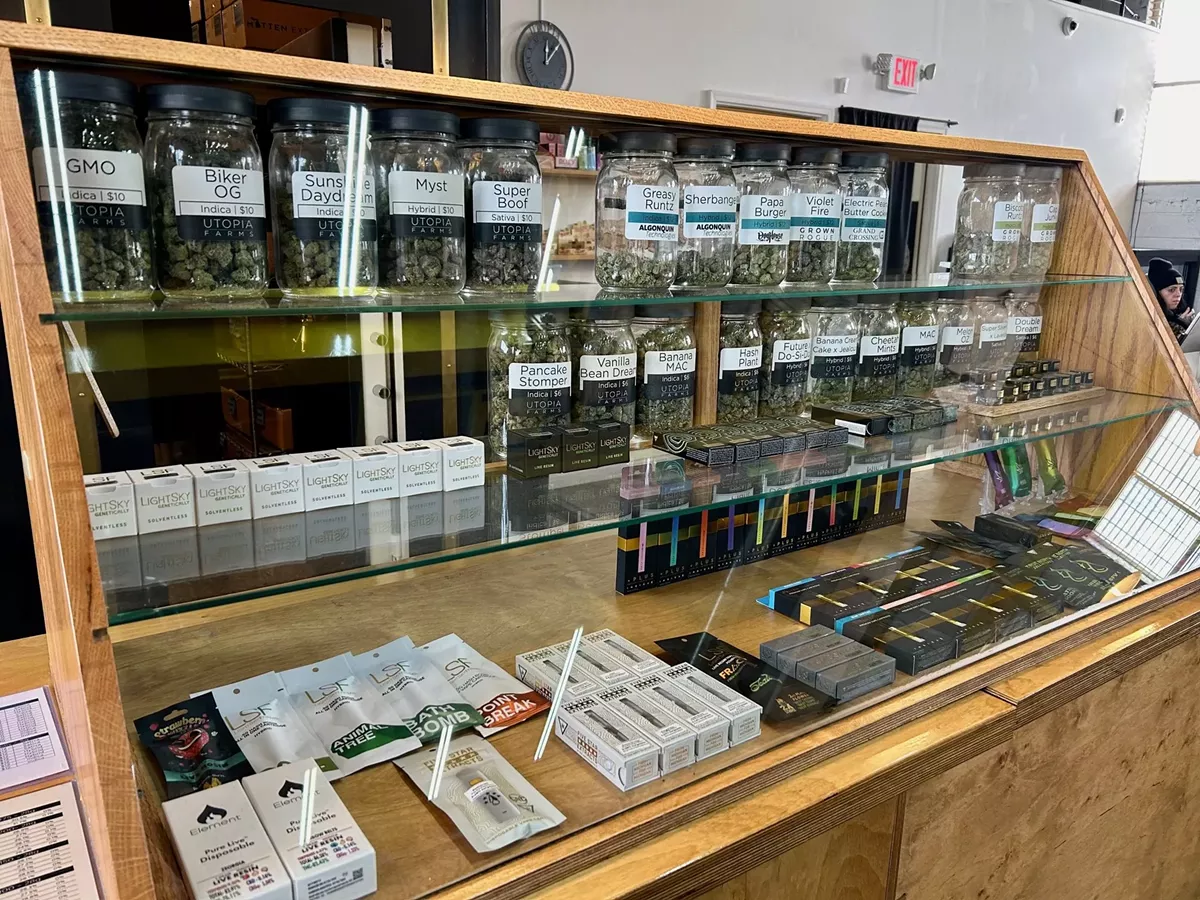Whitmer’s plan to hike cannabis taxes would wreck Michigan’s industry
Consumers will pay more and marijuana businesses will shut down, industry insiders say


Audio By Carbonatix
[
{
"name": "GPT - Leaderboard - Inline - Content",
"component": "35519556",
"insertPoint": "5th",
"startingPoint": "3",
"requiredCountToDisplay": "3",
"maxInsertions": 100,
"adList": [
{
"adPreset": "LeaderboardInline"
}
]
}
]
Welcome to The Straight Dope, a weekly series that explores the cannabis industry in Michigan.
While Michigan’s legal cannabis industry continues to struggle with plummeting prices and business closures, Gov. Gretchen Whitmer is proposing to more than triple the state’s recreational marijuana excise tax as a solution to help fix the state’s crumbling roads.
But by increasing the excise tax from 10% to 32%, Whitmer’s plan risks wrecking the state’s cannabis industry and fueling the black market, dispensary owners and cultivators tell me. That tax is on top of a 6% sales tax that Michigan consumers already pay.
Of the 24 states where recreational cannabis is legal, Michigan’s increased tax rate would be the second highest, trailing only Washington state.
Let’s say you are used to buying $25 for an eighth of cannabis at a dispensary. Today, the state sales and excise taxes would cost you an additional $4. But under Whitmer’s proposal, you would pay a $9.50 tax on the same eighth, raising the price to $34.50.
Raising taxes would only make things worse for struggling cannabis businesses in Michigan, pushing more consumers to the illicit market, where prices are lower and state regulations — like testing for dangerous banned substances — aren’t required. Legal weed is supposed to stamp out illegal sales, not drive customers back to them.
“The margins are incredibly tight in this industry, and companies are literally going out of business left and right,” says Stuart Carter, owner of Utopia Gardens, a dispensary in Detroit. “This would drive people to the black market.”
To justify her aggressive tax increase, Whitmer’s administration falsely claims that the rate hike would merely “close a loophole” that allowed the cannabis industry to dodge higher taxes. Whitmer insists marijuana should be taxed at the same rate as cigarettes, which kill 460,000 Americans a year and remain the leading cause of preventable death, according to the Centers for Disease Control and Prevention.
When Michigan voters legalized recreational marijuana in 2018, they explicitly agreed to a 10% excise tax. Whitmer’s proposal flies in the face of voters’ intentions.
Also, equating cannabis with tobacco is disingenuous. Cannabis is far less harmful, and unlike tobacco, offers proven health benefits.
Incredibly, Whitmer is ignoring the lessons from other states that imposed exorbitant tax rates. In California, its high tax rates have forced thousands of legal businesses to shut down and gave new life to the unregulated market. Recreational marijuana sales are subject to state, local, and county taxes, which significantly drive up the retail price. In addition to a 15% state excise tax and a 7.25% state sales tax, cannabis businesses are also subject to local taxes. In Los Angeles, Oakland, and San Jose, for example, cannabis customers are required to pay an additional 10% local tax.
It’s no wonder that two out of every three cannabis purchases are made in the illicit market, according to Tiffany DeVitt, a board member of the California Cannabis Industry Association and the head of regulatory affairs for CannaCraft.
Despite all of this, California’s combined tax rates are still lower than what Whitmer is proposing in Michigan.
Oregon is facing similar challenges. An oversupply of cannabis and steep taxes pushed growers and retailers out of business, leaving customers with fewer legal options and making it easier for the illicit market to thrive.
Other states with high tax rates on cannabis, like Washington and Colorado, are also feeling the pain.
These cautionary tales show precisely why Michigan voters only imposed a 10% excise tax.
So why would Whitmer risk derailing Michigan’s cannabis industry and threaten the jobs of more than 46,700 workers? Unfortunately, Whitmer’s office declined to respond to my multiple inquiries.
Despite an oversaturated market that’s pulling prices down, Michigan’s marijuana industry hit a record $3.3 billion in sales in 2024, up 9.9% from 2023.
The heavy competition has resulted in record-low prices for recreational marijuana — about $69 an ounce of flower. Although many in the cannabis industry say the low prices aren’t sustainable in the long-term, they are a big reason many consumers aren’t using the black market. Imposing a combined 38% on products would change that.
The low prices are the primary reason Michigan ranks second in the nation for legal marijuana sales per resident, trailing only Alaska, where tourism boosted sales.
Whitmer claims the increase in the excise tax will raise an additional $470 million in taxes, but her administration’s estimate fails to accept the reality that her proposal would chase consumers from the legal market. In California, tax revenue from cannabis sales has fallen from $361.4 million in 2021 to $263.1 million last year as the black market continues to grow.
Cannabis business owners say Whitmer’s plan, which still needs approval from the Republican-led Legislature, is a fast way to upend an industry already in trouble.
“The industry is struggling, businesses are closing, and the black market is thriving,” Jerry Millen, owner of the Greenhouse of Walled Lake, the first licensed dispensary in Oakland County, says. “Higher taxes will only make things worse. Unlike alcohol and cigarettes, cannabis helps people, so why punish those who rely on it? Politicians need to stop seeing this as just another cash grab and start prioritizing the well-being of patients.”
Luckily, Whitmer can’t singlehandedly impose the tax. Whether she can convince the anti-tax Republican Legislature to go along with her plan is far from certain.
If you want us to sample your cannabis products, send us an email at steve@metrotimes.com.






